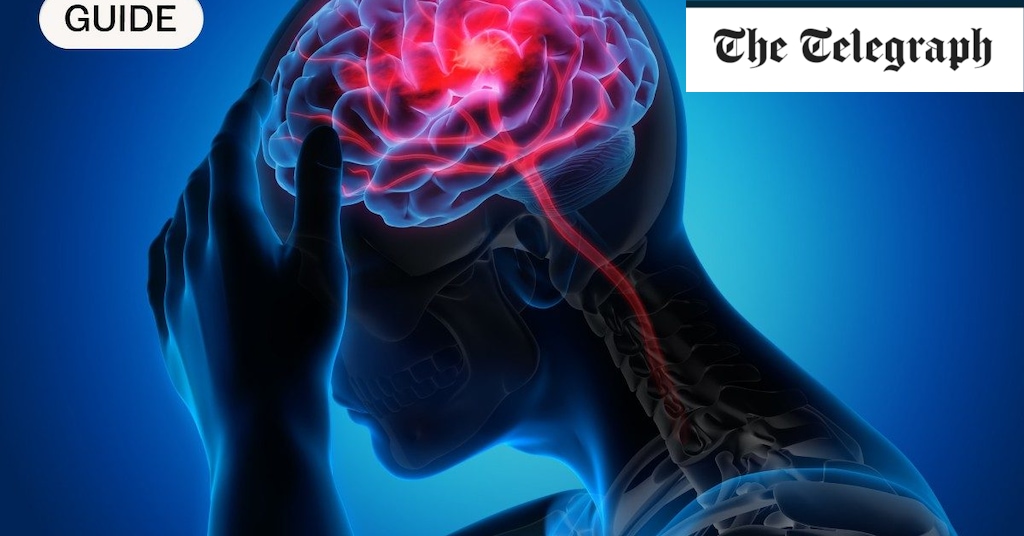According to Dr French, the differences between the two are very subtle with migraine sufferers also often experiencing temporary difficulties with speech and confusion during an attack. However, while the symptoms of a mini stroke tend to feature loss of sensory functions, many migraine symptoms involve sensory alterations which migrate their way down the body.
However, Dr French urges anyone experiencing concerning symptoms to still seek medical attention as soon as possible. “If you think you’re having a stroke, you must get immediate medical attention,” he says. “These are clinical diagnoses so don’t just assume it’s a migraine. I’ve treated people in their 20s who thought they were having a migraine, but they’d actually had a stroke.”
- Elevated cholesterol or blood pressure
- A ‘hole in the heart’
- Neck trauma
- Atrial fibrillation
While elevated cholesterol and blood pressure can drive the likelihood of experiencing a mini stroke, some of the underlying risk factors can be surprising.
Dr French says that one of the major causes of these health events in young people is a patent foramen ovale, otherwise known as a hole in the heart. While this is naturally present in all unborn foetuses, it doesn’t always close naturally when the baby is born which places the heart under greater strain and can lead to blood clots which can travel to the brain.
Other causes can be traumas to the neck which can sometimes even occur in young men going to the gym and attempting to lift weights which are beyond their capability.
However, one of the biggest causes of mini strokes in older people is atrial fibrillation, a condition where the heart starts beating in an irregular and overly rapid fashion.
“The top of your heart is essentially not beating and squeezing properly, and you end up with the blood flow forming a little pool on the left-hand side of your heart,” says Dr French. “A blood clot then forms which gets squeezed into your ventricle and can travel up wherever. It usually goes to the brain and that’s when people have TIAs or strokes.”
Dr French recommends the BE FAST reminder of stroke signs for identifying people who should receive urgent medical attention for a suspected stroke. According to these guidelines you should call 999 if the answer to any of the below questions is ‘Yes’:
- Is the person suddenly having trouble with balance or coordination?
- Is the person experiencing sudden blurred or double vision or a sudden loss of vision in one or both eyes without pain?
- Do they have facial weakness when trying to smile?
- Is the person struggling to raise both arms?
- Are they having difficulty speaking clearly and understanding what you’re saying?
Once the patient gets to see a specialised stroke physician, they will ask questions about the symptoms experienced during the mini stroke, how long they lasted and perhaps given an examination to test strength, sensation, vision, strength and coordination skills.
They may test blood pressure and run a cholesterol test, and they might also check the heart’s electrical activity to look for signs of atrial fibrillation or conduct an ultrasound scan to look for signs of narrowing or blockages within the neck arteries leading to the brain.
If the specialist is concerned, they can conduct a CT angiogram. “We put some dye into a vein and then we can look at all of the arteries from the top of the heart up to the top of the head and go looking for blood clots in the region we would expect,” says Dr French. “As a stroke physician, I’m looking for it to be a particular area of the brain that’s affected. So I know that if you have a TIA on the left hand side of your brain, you’re more likely to have speech problems for example.”
People who have suffered a mini stroke will immediately be given low dose aspirin, which helps to prevent the formation of further blood clots.
Patients may also receive further treatment with specific antiplatelet drugs, such as clopidogrel or dipyridamole, which stop platelets in the blood congealing together as clots. The combination of clopidogrel and aspirin has become a gold standard treatment for mini strokes in the last 10 years, following the results of a major clinical trial called Chance.
In cases where the mini stroke is thought to have been caused by a blood clot, which initially formed in the heart as a result of atrial fibrillation, patients can be prescribed more intensive medications such as anticoagulants or thrombolytics. The latter are drugs that use enzymes to dissolve blood clots. However, specialists tend to be cautious before prescribing these drugs as they can come with a risk of bleeding.
Overall, while mini strokes can occur in people of any age, they are most common in over-55s, often as a consequence of lifestyle choices such as smoking, excessive alcohol and a poor diet.
“It’s a build-up of choices that people have made in their 20s, 30s and 40s,” Dr French explains. “That gives them these problems in their 50s, 60s and 70s. High cholesterol and high blood pressure are the risk factors for a TIA and people choosing to live off microwave meals with a lot of salt in them will drive blood pressure. Processed foods will also play a big part in this over the next 20 to 30 years.”
